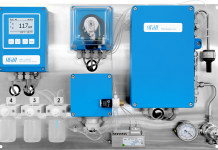Arah Galbraith, Director of The Galbraith Muir Consultancy, talks to Tricia Francis, UKTI NW, about her recent trip to Al Khobar as part of a UKTI NW trade mission.
TF: Sarah, why Saudi Arabia and why now?
SG: I’ve been contemplating Saudi Arabia as a potential target market for some time. I had done enough homework to know there was an opportunity for my services but never moved forward with anything, perhaps because I anticipated cultural difficulties as a businesswoman.
The trade mission to Al Khobar came at the right time in my business calendar, was heading to the right part of the country for industries who could use my services and, as I would be traveling as part of a group, offered me a “comfort zone”, as a first-timer, to travel around and evaluate the market for myself.
TF: With all the news on the Sadara project, Saudi Arabia’s desire to move into downstream industries from oil and gas as well as the “Saudization” programme, this could represent a great opportunity for your business. Did you manage to get more of an understanding of what was happening within the chemical industry over there?
SG: Absolutely! The rate of growth and development of the chemical industry is breathtaking. At first glance it appears they are looking to build, within five years, a world-scale and world class chemical industry. Raw materials will be at one end and higher added value products, anything up to pharmaceuticals, at the other.
I learned there are 3 huge drivers for British companies to engage with the Saudi chemical industry: the move to higher added value industries; the move to Saudization and upskilling Saudi workers; and the “Wa’ed Program” which will introduce entrepreneurship and be a major financer and incubator of new SMEs, which they call “the missing middle”, within the Kingdom.
TF: You visited Saudi Aramco as part of the mission. How important is their role in all of this?
SG: Yes, we visited one of their sites where the procurement team was based. The presentations made it clear what mattered to them. They also described their priorities and how to make contact, including details of the Wa’ed programme. They confirmed they have a challenging target but they are determined to meet it! I would advise anyone not to underestimate the importance of Saudi Aramco. Do your homework to see how you can effectively engage with them and go through their procurement office in The Hague. They are extremely experienced negotiators so be prepared!
TF: What was your experience of the trade mission?
SG: I was interested in traveling to Al Khobar to scope out the situation and liked the idea that a generic mission itinerary was on offer. The preparation was excellent and Janine, our mission co-ordinator, extracted all the data she needed from me in good time to get things organised, including the visa, which was my main worry. They recommended the Gulf Visa and gave excellent guidance and were quick to answer any questions I had. I also met the mission leader, Julian, beforehand so he had a clear understanding of my objectives.
We started out with a briefing including very good speakers from senior levels within Kenz, Jacobs, Foster Wheeler, Sadara, portraying the situation and key challenges Saudi companies are facing. We then had a reception at the Residence of the Head of the British Trade Office. This was like an informal mini exhibition. The BTO had invited around 120 relevant contacts to meet with us. This worked well. I made 4-5 high quality contacts in addition to people found by doing my own homework. The quality of the contacts were excellent: real decision-makers eager to engage positively with new business opportunities.
There was enough space in the itinerary to make additional appointments. I now understand why as the ways of communicating and arranging meetings is totally different from how the UK operates. People will read your emails but see no reason to reply until pretty much the day you want to see them. Texting is also widely used to make appointments! I spent much of Tuesday making appointments for Wednesday utilising the contacts made from the reception.
The hotels are good, with excellent infrastructure for meetings. Staff are also keen to provide anything you need to facilitate business. Traveling as part of a group also added to the richness of the visit and offered good company.
As a means of scoping the market the trade mission took care of the peripheral aspects freeing you up to concentrate on business.
TF: Your main reason for delaying looking at Saudi Arabia as a potential market was your worry about the business culture as a woman. How do you view this now?
SG: One of the first things you advised, Tricia, was to talk to Mumtaz Abdulla, one of the female Commercial Officers in Al Khobar. She gave me an excellent insight, informed me of the relevant dress code and what I should expect. When I was out in public I would need to wear an abaya (a long black cloak), and have a head scarf at the ready if required. As a woman in business, however, there would be no issue talking to male or female decision makers.
As I was nervous about the culture I am glad I went as part of a group for my first visit. I would now be quite happy to visit on my own knowing the British Trade Office is there for support and general guidance. As a complete aside, it was actually quite nice having no worries about what to wear or driving.
TF: Are you pleased with the results of your visit? What tips would you give for readers who might be considering sales to Saudi Arabia?
SG: My objectives were to fact find and connect with potential business partners with the aim of getting business by the end of 2014. I have come away with 4 really substantive opportunities and a few “early days” ones. I am now busy progressing these.
My tips would be:
n Visit, visit, visit. Your credibility as a business partner goes up tremendously each time you visit. There is no substitute for going there.
n When the chemical companies in Eastern Province are up and running they will need the supporting services. Think wider than just the chemical industry as there will be growing communities and a growing population.
n Allow at least one week for your Visa and make sure you adhere to the “leave two clear pages facing each other” in your passport.
n For businesswomen there are no issues in talking to male or female decision makers, just be sensitive to local culture on mixed meetings.
n Fashion tip for abaya wearers: invest in a large bag to hold folders, notebooks, laptops etc. Abayas are long and the inexperienced wearer will need both hands free to negotiate stairs!
Obviously, if anyone wishes to know more I would be more than happy to share my experience.
The Galbraith Muir Consultancy Limited
T: 07711 557285
E: stg@galbraithmuir.com
W: www.galbraithmuir.com













